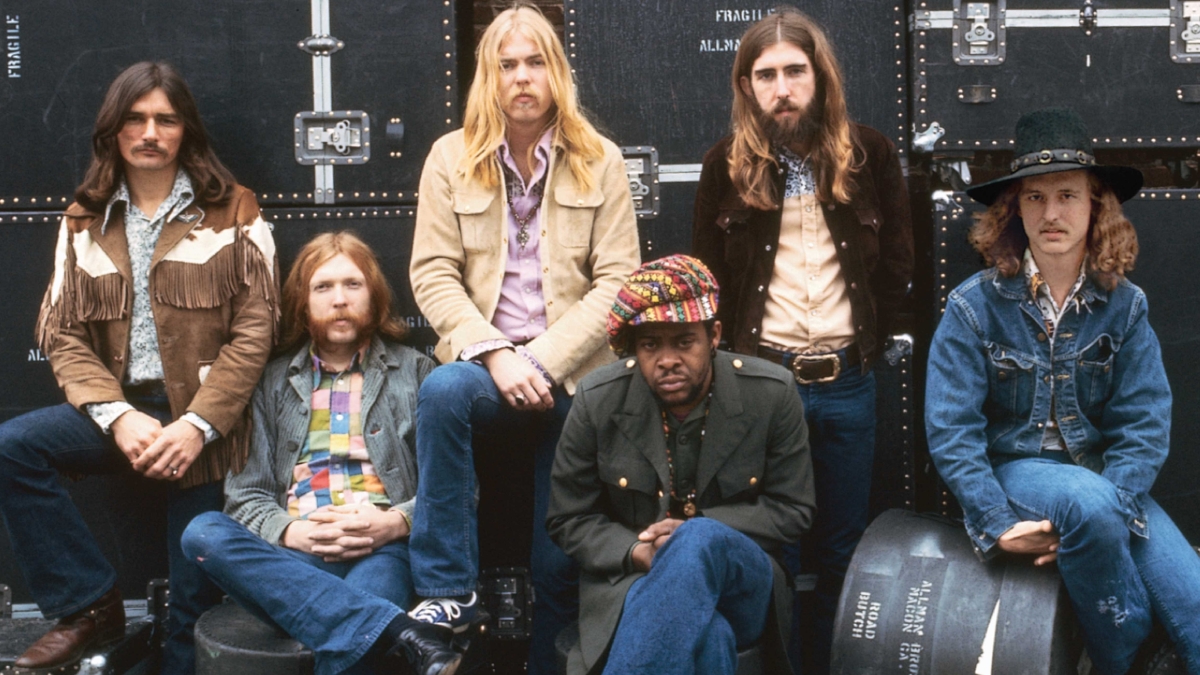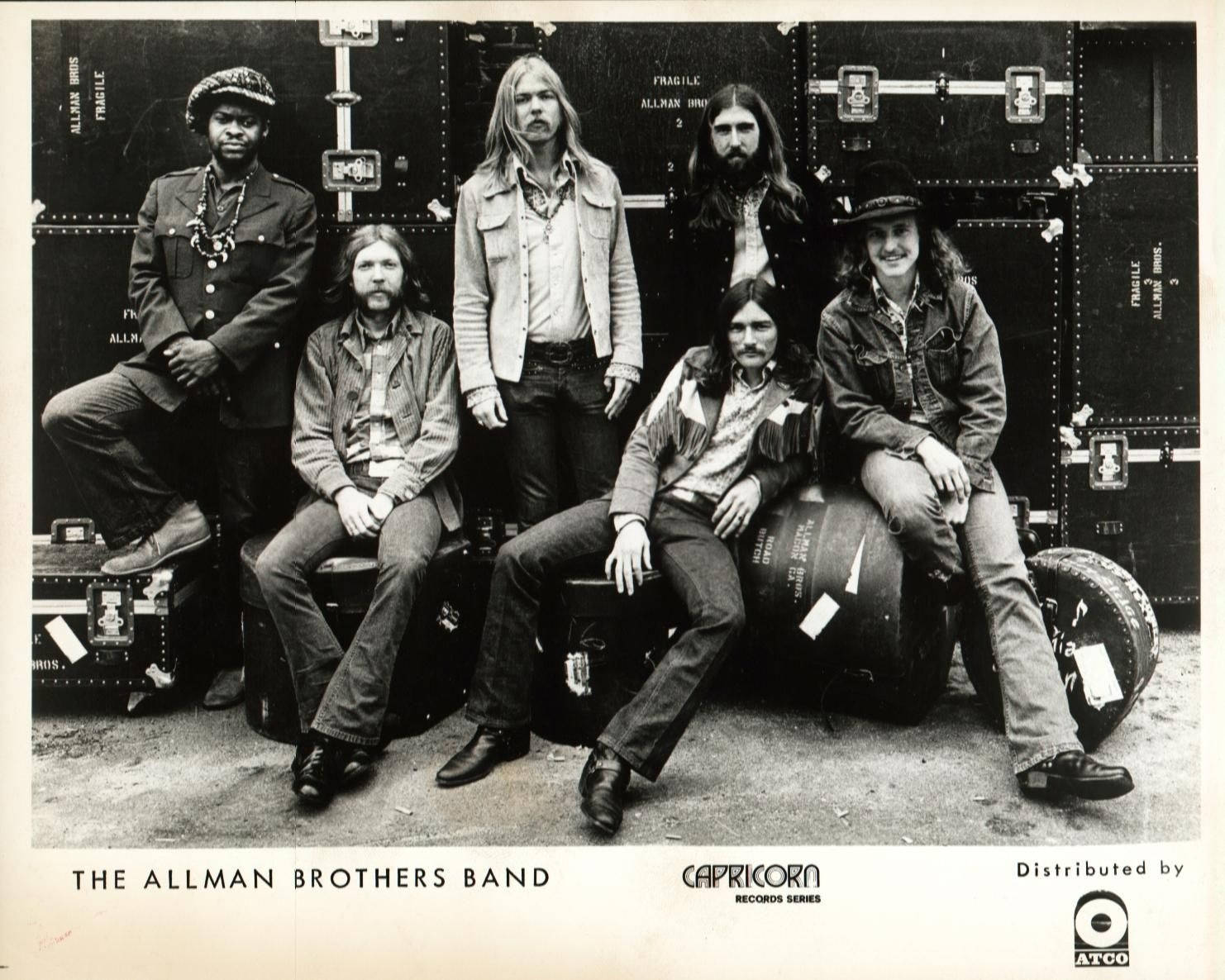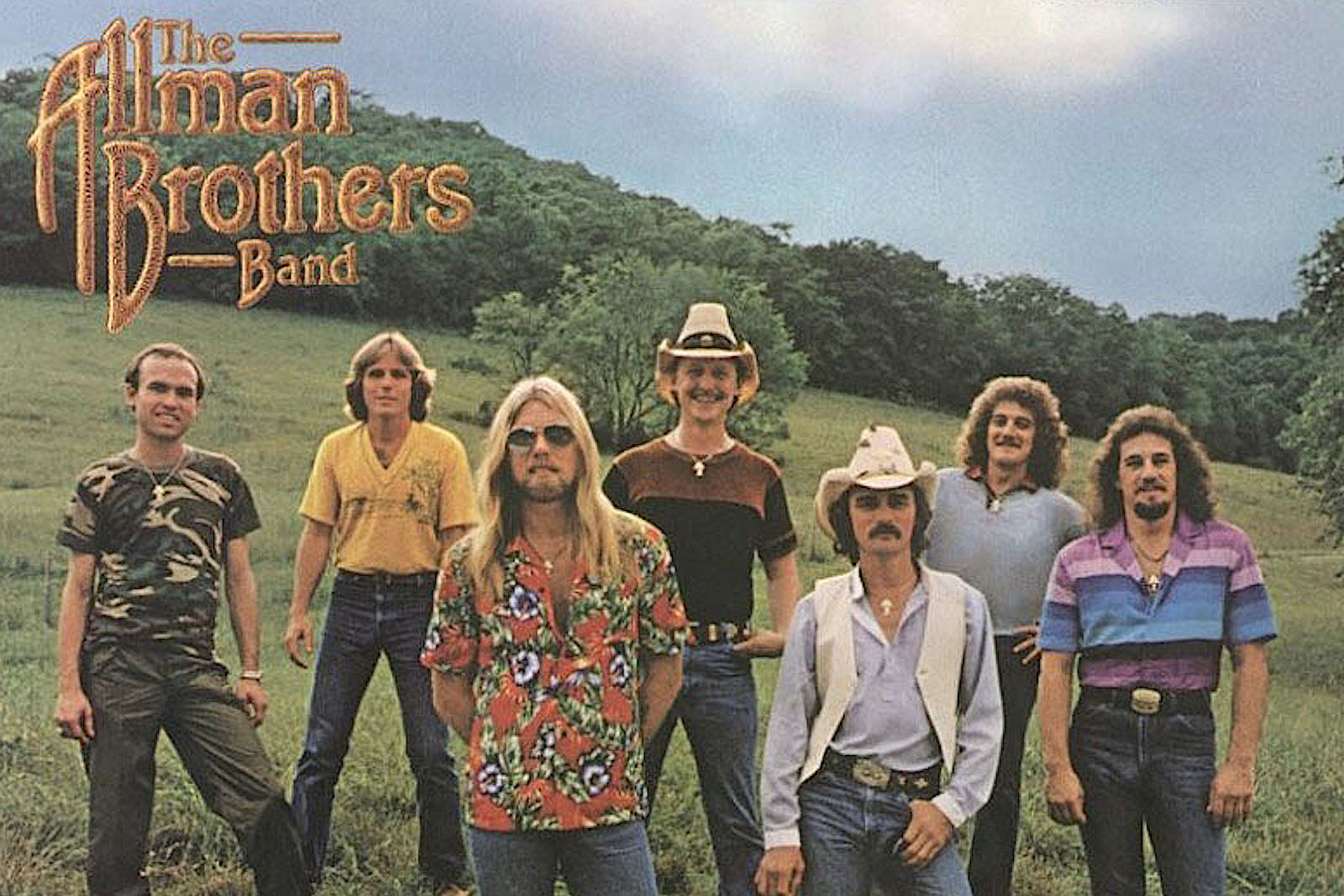The Allman Brothers Band - A Musical Story
For anyone who appreciates music that just feels right, the story of the Allman Brothers Band is a pretty cool one. This American rock group, you know, actually got its start in Jacksonville, Florida, way back in 1969. It's almost like a family affair, too, because the two main folks who got it going were brothers, Duane Allman, who was quite the talent on slide and lead guitar, and his brother, Gregg Allman, who handled a lot of the singing and played the organ. They really brought something special to the musical scene, and you could say, in a way, they set a new standard for what a rock band could be.
Their beginnings were quite humble, yet they held a lot of promise, almost like a quiet spark before a big fire. This group, as a matter of fact, came together with a clear vision, aiming to create sounds that were both familiar and fresh. Duane, with his guitar work, and Gregg, with his voice and organ playing, formed a core that would shape their unique sound for years to come. It’s interesting to think about how these two brothers, just starting out, would go on to have such a lasting impact on how people hear rock music, really.
The musical landscape of the late 1960s was, in some respects, ready for something new, and the Allman Brothers Band, with their distinct approach, arrived at just the right moment. They weren't just another band playing tunes; they were, like, putting together a whole new kind of musical experience. Their early days in Florida were a time of putting pieces together, finding their rhythm, and creating the initial sounds that would eventually make them famous. You could say they were, in a way, building something truly special from the ground up, a sound that would resonate with many folks for a long, long time.
Table of Contents
- The Allman Brothers Band - How Did It All Begin?
- The Sound of the Allman Brothers - What Made Them Unique?
- Who Were the Key Players in the Allman Brothers Band?
- Important Moments for the Allman Brothers
- The Allman Brothers Band - What Happened Later On?
- The Allman Brothers Band - Their Enduring Influence
- Looking Back at the Allman Brothers Band
The Allman Brothers Band - How Did It All Begin?
The Allman Brothers Band, you know, started their musical journey in a rather specific place and time. It was March of 1969 when these musical paths crossed, forming what would become a truly iconic group. The heart of the band, in a way, was formed by the two brothers, Duane Allman, who played the guitar with a lot of feeling, and Gregg Allman, who handled the organ and vocals with a distinct flair. They were, basically, the foundation upon which everything else was built, bringing their individual talents together to create something bigger than themselves.
Beyond the brothers, the initial setup of the band included a few other really important folks. There was Dickey Betts, who also played guitar and sang, adding another layer to their sound. Berry Oakley, a bassist, provided the low-end groove that was so central to their style, and then there were the drummers, whose rhythmic contributions really pushed their music forward. So, it wasn't just a two-person show; it was a collective effort right from the start, with each member bringing something special to the mix, making the Allman Brothers Band a truly collaborative effort.
Their roots were planted firmly in Jacksonville, Florida, which, in some respects, gave them a certain feel and vibe. Duane Allman, before putting this group together, had actually spent time as a session guitarist down in Muscle Shoals, a place famous for its musical output. This experience, you know, gave him a lot of insight into how to create a new kind of rock group, one that wasn't quite like anything else out there at the time. He had a vision for sounds that blended different traditions, and that vision really took shape in the early days of the Allman Brothers Band.
The idea was to form a band that went beyond just playing standard rock tunes. It was, almost, about creating a whole new musical language. The members they gathered, each with their own unique abilities, helped to make this vision a reality. From the very first notes they played together, you could tell there was a special connection, a shared understanding of the music they wanted to make. This early period was, in a way, about finding their collective voice, setting the stage for all the amazing music that would follow from the Allman Brothers Band.
The Sound of the Allman Brothers - What Made Them Unique?
When you listen to the Allman Brothers Band, you might notice something pretty special about their sound. It wasn't just one thing; it was, like, a really interesting mix of different musical styles all rolled into one. They had this way of blending the deep, soulful feelings of blues music with the complex, free-flowing nature of jazz, and then, you know, adding a touch of the storytelling and melodies you find in country music. This combination, in some respects, made their sound truly unique and very much their own.
This blend wasn't something you heard every day, especially not in the rock music of that time. Their approach allowed them to create long, sprawling musical pieces that felt both structured and spontaneous. The blues gave them their raw emotion and grit, while the jazz elements provided room for improvisation and extended musical conversations between the instruments. And the country touches, well, they just gave it a certain down-to-earth, relatable quality, making the Allman Brothers Band's music feel genuine and heartfelt.
It’s really fascinating how they managed to take these distinct musical elements and weave them together so seamlessly. You could be listening to a guitar solo that had all the wailing intensity of a blues legend, and then, just a little later, you’d hear a section that felt like a smooth, intricate jazz piece. This willingness to explore different genres and bring them into their rock framework is, arguably, one of the main reasons why the Allman Brothers Band stood out so much. They weren't afraid to experiment, and that courage paid off in a big way, creating a sound that was truly their signature.
Their music, in a way, spoke to a lot of people because it had so many layers. It wasn't just background noise; it was something you could really sink your teeth into, musically speaking. The way they combined these sounds meant that their songs had a depth and richness that kept listeners coming back for more. This unique musical fingerprint is, very much, a big part of the lasting appeal of the Allman Brothers Band, making them a group whose influence can still be heard in music today.
Who Were the Key Players in the Allman Brothers Band?
The Allman Brothers Band, as a matter of fact, had a number of incredibly talented people who contributed to their sound over the years. Right at the very start, as we talked about, there were the brothers, Duane Allman, who was known for his amazing slide guitar work, and Gregg Allman, who sang and played the organ. These two were, basically, the core, the very heart of the band's initial sound and direction. Their musical connection was, you know, something special to hear, a real bond that came through in their performances.
But the band’s story also includes other crucial members who helped shape their famous sound. Dickey Betts, for example, was another guitarist and vocalist who added his own distinct flavor to the group’s music. His playing, in some respects, provided a wonderful contrast and complement to Duane’s style. Then there was Berry Oakley on bass, whose steady and inventive playing was, really, the anchor for their long, improvisational jams. And, of course, the drummers, whose powerful and intricate rhythms gave the band its driving force. These early members, together, forged a sound that was truly groundbreaking for the Allman Brothers Band.
As time went on, and life brought its own changes, other gifted musicians joined the ranks of the Allman Brothers Band, too. After the sad passing of Berry Oakley, for instance, the group brought in Chuck Leavell on keyboards and Lamar Williams as the new bassist for their 1973 album, *Brothers and Sisters*. These additions, you know, helped the band continue to evolve its sound while still keeping that core feel. It’s interesting how a group can adapt and bring in new talents, yet still maintain its identity, and the Allman Brothers Band certainly did that.
Later on, other musicians, like Warren Haynes and Derek Trucks on guitar, Oteil Burbridge on bass, and Susan Tedeschi, among others, also played with the Allman Brothers Band. These players, as a matter of fact, helped carry the band’s legacy forward, introducing their music to new generations while honoring the original spirit. It’s pretty remarkable how many talented people contributed to the band’s story, making the Allman Brothers Band a true collective effort over its many decades.
Important Moments for the Allman Brothers
The journey of the Allman Brothers Band was, you know, full of significant moments, some triumphant and others quite challenging. One of their most popular tunes, "Ramblin' Man," really captured the hearts of many listeners and became one of their signature pieces. Then there's "Jessica," an instrumental track that showcases their amazing musicianship and ability to create intricate, melodic pieces without words. These songs, in a way, became anthems for a generation and are still loved by many folks today, truly highlighting the band's musical skill.
However, the band also faced some really tough times, which, you know, tested their resolve. There was a federal drug trial, for example, where Gregg Allman had to give testimony. This event, in some respects, caused a temporary halt to the Allman Brothers Band's activities, bringing things to a standstill for a bit. It was a period of great difficulty, and it showed just how much pressure the band was under, both personally and professionally. These kinds of events, you know, can really affect a group, and they certainly left their mark on the band's story.
Despite these challenges, the Allman Brothers Band, as a matter of fact, had a remarkable ability to come back. Thirty-five years ago today, on July 3, 1990, they released their album called *Seven Turns*. This record, you know, marked a really important moment for them, as it was their first album since 1981’s *Brothers of* which had been a bit disjointed. *Seven Turns* was, basically, seen as a comeback, showing that they still had plenty of great music to offer and that the Allman Brothers Band was back in full swing, ready to create new sounds for their fans.
Their career, spanning over four decades, was, in a way, a long and sometimes tumultuous one. They experienced incredible highs, like the widespread love for their greatest hits, and also faced deep personal losses and legal troubles. Yet, through it all, the band kept making music and performing for their dedicated following. This enduring spirit, you know, is a testament to their passion for their craft and the powerful connection they had with their audience, making the Allman Brothers Band a truly resilient group.
The Allman Brothers Band - What Happened Later On?
The Allman Brothers Band, you know, continued to make music and tour for many years after their initial formation. Their journey saw them evolve, bringing in new players and adapting to different periods in music. For instance, following the sad motorcycle accident that took the life of bassist Berry Oakley, the group brought in some new faces to fill those important roles. They recruited Chuck Leavell to play keyboards and Lamar Williams to handle the bass duties for their 1973 album, *Brothers and Sisters*. This change, in a way, showed their ability to keep going, even after facing such a difficult loss.
The band, which had roots in Jacksonville, Florida, also became very much associated with Macon, Georgia, over time. It was, basically, a central hub for their activities and creative endeavors. Their music continued to resonate with people, and they built a really strong following, which, in some respects, grew with each new release and every live performance. The fact that they could maintain such a loyal fan base for so long is, you know, pretty remarkable, showing the deep connection people felt to the Allman Brothers Band and their sound.
Over their many years together, the Allman Brothers Band went through a lot of changes and faced numerous ups and downs. Their career, which lasted for about 45 years, was, in a way, a testament to their staying power and their dedication to the music. They had periods of great success and widespread popularity, and then, you know, times when things were a bit more challenging. But through it all, they kept playing, kept creating, and kept sharing their unique blend of sounds with the world, making the Allman Brothers Band a constant presence in the music scene.
Finally, after more than four decades of making music, the Allman Brothers Band officially decided to stop performing together in 2014. It was, basically, the end of an era for a group that had meant so much to so many people. This decision, you know, marked the close of their active career, but it certainly didn't mean the end of their impact. Their music, as a matter of fact, continues to be heard and loved by fans all over, showing that even though the band is no longer together, their songs live on, a lasting gift from the Allman Brothers Band.
The Allman Brothers Band - Their Enduring Influence
Even though the Allman Brothers Band officially stopped playing together in 2014, their influence on music, you know, continues to be felt very strongly. Their contributions to what people call Southern rock were, in a way, truly groundbreaking. They didn't just play music; they helped to shape a whole genre, showing other musicians what was possible when you blended blues, jazz, and country in a rock setting. This legacy is, basically, a big part of why their music still matters so much today.
You can find countless examples of their impact, too. Many bands and artists who came after them, as a matter of fact, have talked about how the Allman Brothers Band inspired their own work. Their long, improvisational jams, their twin guitar harmonies, and their soulful vocals set a standard that many have tried to follow. It's almost like they laid down a blueprint for a certain kind of American rock music, a style that feels both raw and sophisticated at the same time. This influence is, you know, something that will likely continue for many years to come.
Beyond just other musicians, the Allman Brothers Band's music has, in some respects, found a lasting place in the hearts of everyday listeners. You can still find their full albums and greatest hits compilations being enjoyed by thousands of people, with many videos online having, like, tens of thousands of subscribers who love their rock and roll. This continued popularity, you know, speaks volumes about the timeless quality of their songs. It's not just about nostalgia; it's about music that genuinely connects with people, no matter when it was made.
Their story is, in a way, a reminder of the power of music to transcend time and change. The Allman Brothers Band created a body of work that is, basically, rich with feeling, technical skill, and a deep understanding of different musical traditions. Their songs are more than just tunes; they are pieces of art that continue to inspire, entertain, and move people. This enduring legacy is, you know, a true testament to the remarkable talent and vision of the Allman Brothers Band.
Looking Back at the Allman Brothers Band
Looking back at the Allman Brothers Band, we can see a musical group that really left its mark. They started in Jacksonville, Florida, in 1969, with brothers Duane and Gregg Allman leading the way. Their sound, a mix of blues, jazz, and country, was truly special and helped define a whole new kind of rock music. Key members like Dickey Betts and Berry Oakley were also central to their early success, making the Allman Brothers Band a powerful force from the start.
Their journey included famous songs like "Ramblin' Man" and "Jessica," but also tough times, like legal challenges. Yet, they kept going, even releasing a comeback album, *Seven Turns*, in 1990. Over the years, new talents joined, like Chuck Leavell and Lamar Williams, keeping their music fresh. The band, which also had strong ties to Macon, Georgia, played for over four decades, finally stopping in 2014. Despite no longer performing, the Allman Brothers Band's impact on music and their many beloved songs continue to be celebrated, showing their lasting importance.

Unveiling the Musical Legacy of John Allmaninger: A Cornerstone of the

Download Classic Album Cover - The Allman Brothers Band Wallpaper

Allman Brothers Band Perform ‘Whipping Post’ at Eric Clapton’s